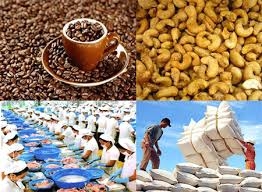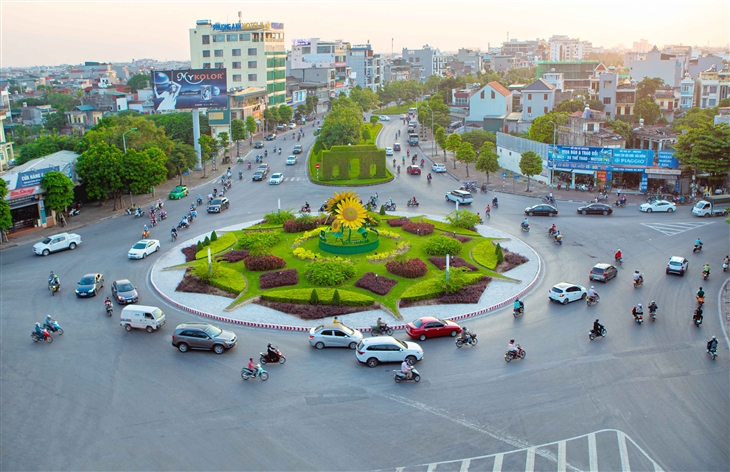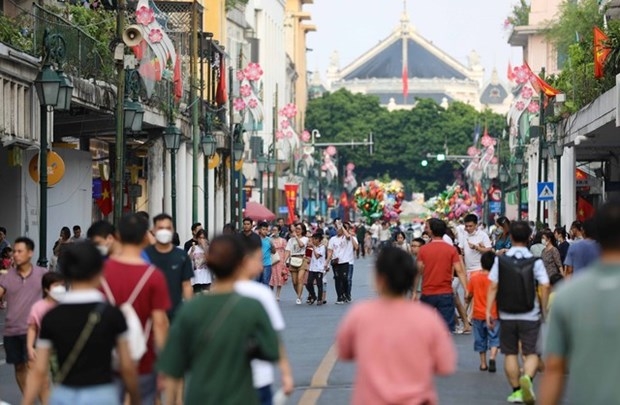Vietnam’s agricultural, forestry and fishery export forecast for 2024
Monday, March 11,2024
AsemconnectVietnam - After evaluating the favorable and difficult factors of the world and domestic economy, the Ministry of Agriculture and Rural Development has set an agricultural, forestry and fishery export target of 55 billion USD in 2024.
In particular, vegetables, fruits, and rice were key product groups and the exports of those groups of items are forecast to grow strongly. The exports of cassava, cashew, and pepper products are also increasing again.
According to analysis by experts, in the coffee industry, domestic and world prices are at the highest level ever.
It is forecasted that coffee will set a record export turnover of 4.5 - 5 billion USD in 2024. Similarly, rice products are also expected to have a successful year, when signals from markets are quite positive. Since the beginning of 2024, rice export businesses have received many orders.
Thus, the agricultural sector is expected to have 3 products (excluding wood and forestry wood products) that can enter the 5 billion USD club in 2024, including vegetables, rice, and coffee.
Assessing the potential of the rising "stars" - the fruit and vegetable industry in 2024, talking with Customs Magazine reporters, General Secretary of the Vietnam Fruit and Vegetable Association Dang Phuc Nguyen said that in 2024, the fruit and vegetable industry is expected to grow about 15-20%, continuing to reach new peaks, possibly surpassing 6 billion USD, even reaching the 7 billion USD mark. Vietnamese fruits and vegetables have huge resources, but their export turnover only accounts for about 2-3% of the world's total fruit and vegetable export turnover. “There is still a lot of room for this industry. The important thing is how to exploit those potentials well," Mr. Dang Phuc Nguyen added.
Promote the "smart border gate" mechanism in goods circulation
Although there are many advantages, difficulties and challenges are not absent, because according to Deputy Minister of Agriculture and Rural Development Phung Duc Tien, the strength of deep processing and trade building has not been fully exploited. Brands as well as quality requirements are still barriers for Vietnamese agricultural products. Although Vietnamese agricultural products have changed in quality in recent times and many businesses have complied with import regulations, this is still a big challenge to maintain a strong and sustainable position in import markets.
“To promote the exports of agricultural products and maintain a strong and sustainable position in import markets, the Ministry of Agriculture and Rural Development will work with businesses to monitor and manage the production process and issue area codes to meet standards from many major markets. The Ministry also analyzes the market to have specific strategies for each time and each industry, creating a breakthrough in agricultural export," Deputy Minister Phung Duc Tien emphasized.
Also according to Deputy Minister Phung Duc Tien, from the beginning of 2024, the entire industry has actively implemented solutions to boost production and business, especially promoting trade and consumption of agricultural products. Vietnamese agricultural products are increasingly expanding their market and international market share. China is one of Vietnam's largest agricultural product import markets in 2024. Deputy Minister Phung Duc Tien said the agricultural industry will continue to effectively exploit this market, and promote the "smart border gate" mechanism in goods circulation.
Along with maintaining traditional markets such as the United States, Japan, and the European Union (EU), in the coming time, the Ministry of Agriculture and Rural Development strives to open new markets with much potential, especially Halal Muslim countries, Africa, etc. At the same time, businesses should take advantage of new generation free trade agreements (FTAs), especially CPTPP and EVFTA to promote the exports of key agricultural products. The ministry will accompany and support businesses to sign new export orders; coordinate and support trademark and geographical indication protection for potential export products.
Increase agricultural export value through deeply processed products
As Vietnam aims for higher export value and new records in export turnover of key agricultural products in 2024, experts have called for greater commitment to deep processing, saying that this approach will not only boost product competitiveness but also create a professional industry chain and exceptional products that bring in higher value.
The pepper industry is a typical example. The Vietnam Pepper and Spice Association (VPSA) estimated a 10.5% year-on-year decrease in pepper production to 170,000 tonnes in 2024.
A favourable outlook was still anticipated for pepper exports this year due to reduced production and low inventory levels worldwide. However, the sector must attach importance to deep processing to increase export value. The current proportion of processed pepper products for export stands at a mere 30%, indicating the need for a significant improvement.
Despite the projected increase in pepper prices, pepper in the Central Highlands and Southeast regions has faced stiff competition from other crops, notably durian. This highlights the urgency for the industry to prioritise deep processing, not only to increase export value but also to provide farmers with peace in their mind amid fluctuating prices and market challenges, said VPSA President Hoang Thi Lien.
A representative of the Vietnam Coffee Cocoa Association (VICOFA) said that Vietnamese coffee is a sought-after product by importers. In June last year, for the first time in history, farmers had no coffee to sell. Currently, the inventory of this item has also decreased sharply, thus, the coffee prices are expected to reach new peaks in 2024.
From the perspective of a leading exporter to major markets, Phan Minh Thong, Chairman of the Board of Directors of Phuc Sinh Corporation, a Vietnamese pepper and coffee trader based in Ho Chi Minh City, highlighted the indispensable role of continued investment in deep processing for the sustainable development of Vietnam's coffee and black pepper sectors.
The seafood sector also recognised the importance of deep processing to enhance competitiveness, said industry insiders.
Kim Thu, a shrimp market expert at the Association of Seafood Exporters and Producers (VASEP), underlined the need for the Vietnamese shrimp industry to improve its competitive capacity by promoting processing to increase product value. Currently, value-added processed shrimp products contribute 40-45% to the total shrimp export value annually, she noted.
Dang Phuc Nguyen, General Secretary of the Vietnam Fruit and Vegetable Association (Vinafruit), said that to become a fruit and vegetable export powerhouse in Southeast Asia and the world, it is essential for Vietnam to improve several issues, including deep processing.
Only 25% of exported fruits and vegetables have been processed whereas it is up to 50% in countries with strong export potential in this regard.
According to him, thousands of businesses engage in processing in Vietnam but they operate on a small scale. Therefore, it is a must to prioritise investment in and have special mechanisms to encourage deep processing.
CK
Source: VITIC/vietnamplus.vn/haiquanonline.com.vn
Vietnam’s rice looks for high value export
Vietnam’s financial market favoured by RoK investors
Retail gives boost to Vietnam’s economic outlook: Hong Kong-based news site
Breakthrough solutions to attract large-scale FDI projects
Wood, furniture industry advised to improve added value
FDI attraction up 38.6% in two months
DAILY: Vietnamese pepper prices remained unchanged on March 7, 2024
DAILY: Vietnamese coffee prices rose by 2000 VND on March 7, 2024
Vietnam’s trade turnover in first two months of 2024
Bright prospects for FDI attraction in 2024
Tax sector to tighten management for e-commerce activities
HCM City attracts 176.71 million USD in export processing and industrial zones
Industrial production index increased in 56 localities in 2 months
Retail sales of goods, services increase by 8.5% in February: GSO

Plan of Hai Duong province for a period of 2021 - 2030, ...
Organize space reasonably and harmoniously, focusing on connecting Hai Duong in common development space, actively contributing to the ...Plan of Hau Giang province in a period of 2021 - 2030, ...
Sustainable forestry development program in a period of ...
Supporting industry development program in Da Nang city in ...
Implementation plan of Scheme on promoting agricultural, ...

Hanoi harnesses “soft power” of culture in development
Since joining the UNESCO Creative Cities Network in the “Design” category in 2019, Hanoi has organised a multitude of activities relating ..."Happy Tet 2024" to open in Hanoi
Vietnamese literary works served up at Brussels restaurant



